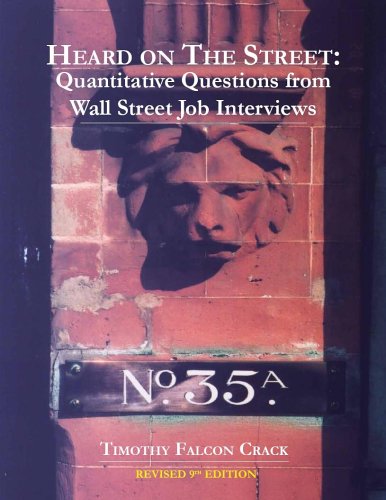Heard on the street: quantitative questions from Wall Street interviews pdf download
Par simpson josiah le jeudi, février 16 2017, 21:41 - Lien permanent
Heard on the street: quantitative questions from Wall Street interviews. Timothy Falcon Crack

Heard.on.the.street.quantitative.questions.from.Wall.Street.interviews.pdf
ISBN: 0970055234,9780970055231 | 274 pages | 7 Mb

Heard on the street: quantitative questions from Wall Street interviews Timothy Falcon Crack
Publisher: T.F.Crack
Goldman: I didn't take the usual route to Wall Street. While last week's employment report eased investor jitters that the Federal Reserve could cool the pace of its bond buying in the very near term, some investors are preparing for the Fed to reduce its quantitative easing by the end of the year. The prospect of the Fed beginning to scale back has raised questions about stocks' future performance. Heard on the Street: Quantitative Questions from Wall Street Job Interviews Product DescriptionThe tenth edition contains 165 quantitative questions collected. Do our emotions change according to the music we hear? The e-book consists of more than one hundred thirty quantitative queries collected from true financial investment banking, investment administration, and alternatives buying and selling job interviews. It is so widely viewed as the right thing to do that it should set off all contrarian alert systems. But perhaps there is room for caution about this trade. Wall Street seesawed between modest gains and losses. Lutz Kilian, Professor of Economics at the University of Michigan, questions their analysis and highlights that their paper actually does not shed any light on the role of Wall Street speculation. Heard on the Street: Quantitative Questions from Wall Street Job Interviews. �That sound you hear might be Mike Wallace rolling over in his grave,” host Jon Scott said. Daily Bell: You held senior jobs on Wall Street, including a gig as global head of bond research at Bank of America with 140 professionals reporting to you. In short, readers of Juvenal and Petrella (2012) should beware that there is nothing in their analysis that sheds light on the quantitative importance of financial speculation or that would justify tighter regulations for oil derivatives markets.